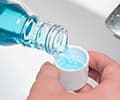What Is Dry Mouth?
Dry mouth is also known as xerostomia. It refers to a condition in which your salivary glands aren't making enough saliva to keep your mouth wet. Saliva is essential because it prevents tooth decay, enhances your ability to taste, makes it easier for you to swallow, and aids in healthy digestion. So dry mouth can have an impact on your overall health.
How do you know if you have dry mouth? The Mayo Clinic notes that if you have this condition, you will have the following symptoms:
- Thick and stringy saliva
- Bad breath
- Difficulty speaking, chewing, and swallowing
- Dry or sore throat, or generally a feeling of dryness in your mouth
- Hoarseness
- Grooved or dry tongue
- Changes in your sense of taste
How to Treat Dry Mouth at Home
To relieve the symptoms of dry mouth at home, you can try any of the following treatments:
- Sucking on sugar-free hard candies or chewing sugar-free gum
- Sipping or sucking ice chips to moisten your mouth through the day
- Adding moisture to your bedroom as you sleep, in the form of a humidifier
- Trying over-the-counter saliva substitutes that contain xylitol, carboxymethylcellulose, or hydroxyethyl cellulose.
- Practicing breathing through your nose and not your mouth
Certain products can make your symptoms worse, and you should avoid them if you can. These include caffeine, alcohol, tobacco, OTC antihistamines and decongestants, and sugary or acidic foods.
Adopting a good oral hygiene routine is also key: brush your teeth with fluoride toothpaste twice a day and clean daily between your teeth with interdental brushes, floss, or water flossers.
How Will Your Doctor or Dentist Treat Dry Mouth?
So when should you see your dentist or doctor for your dry mouth? If your symptoms aren't going away with any at-home treatments, it's best to consult with your dentist or doctor. Either of them may prescribe medication that stimulates saliva production.
It should also be noted that dry mouth can be related to another health condition. The Cleveland Clinic points out that dry mouth is a common side effect of drugs used to treat allergies, pain, anxiety, depression, hypertension, diarrhea, urinary continence, and Parkinson's disease. Your doctor may decide to change your medication in these cases to help with your dry mouth symptoms.
Certain diseases can also cause dry mouth. For example, Sjögren's syndrome, Alzheimer's disease, or stroke. In these cases, your doctor will recommend a treatment that increases healthy saliva flow.
Experiencing dry mouth can be quite uncomfortable because it causes difficulty with eating and swallowing. But with some at-home treatments, you can very easily and effectively treat your dry mouth. And if your symptoms continue, your doctor and dentist can help ensure that you'll go back to enjoying your favorite foods in no time at all!
This article is intended to promote understanding of and knowledge about general oral health topics. It is not intended to be a substitute for professional advice, diagnosis or treatment. Always seek the advice of your dentist or other qualified healthcare provider with any questions you may have regarding a medical condition or treatment.
ORAL HEALTH QUIZ
What's behind your smile?
Take our Oral Health assessment to get the most from your oral care routine
ORAL HEALTH QUIZ
What's behind your smile?
Take our Oral Health assessment to get the most from your oral care routine
Join Us
Get the best of your oral health routine and take it to the next level with expert advice, recommendations, products and solutions and special offers.
Join Us
Get the best of your oral health routine and take it to the next level with expert advice, recommendations, products and solutions and special offers.















